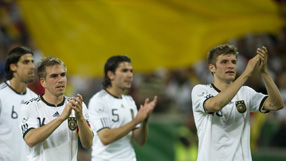
The task for Serbia, Australia and Ghana heading into Group D is to show that up as wishful thinking, and prove the World Cup is no place to pin your faith on novices and a striker who managed three league goals all season.
Ghana's problem is that they have suffered a big loss of their own, with Michael Essien ruled out with an injury he suffered on African Nations Cup duty.
The Black Stars, beaten in the last 16 four years ago, had been tipped as Germany's big rivals for top spot, a vital target given the runners-up could face England in the second round, but without Essien their hopes have taken a huge body blow.
Their preparations were further disrupted when they changed base camp to Sun City on Wednesday after two nights in a Pretoria hotel, citing technical issues.
Unpredictable Serbia, playing in their first tournament as an independent nation and with a deep squad of technically gifted players, should still prove dangerous rivals while Australia, unlucky to lose to Italy in the last 16 four years ago, are back with a point to prove.
Adding a certain fratricidal spice to the group is the fact that Ghana coach Milovan Rajevac is himself a Serb, making the clash between the two teams on June 13 in Pretoria a deliciously unpredictable way to start the group.
FITNESS BOOST
The best features, fun and footballing quizzes, straight to your inbox every week.
Australia, Germany's first opponents in Durban later the same day, have been boosted by some welcome injury news for a change, with midfielder and chief goal threat Tim Cahill given the all-clear from a neck injury and Harry Kewell back training.
Germany, three times World Cup winners, are clearly the favourites to win the group but a lot will depend on how their less experienced players take to the loftiest of stages.
Coach Joachim Low, who was Jurgen Klinsmann's assistant when they reached the semi-finals on home soil four years ago, will likely go into that first game with five players boasting 10 or fewer appearances each.
That is doubtless why the coach is ready to keep faith with Miroslav Klose up front despite a desperately disappointing season with Bayern Munich.
Klose, who turned 32 on Wednesday, scored five goals at each of the last two World Cups and has a habit of starting with a bang.
The newcomers for Germany include players of real promise, including midfielders Sami Khedira and Mesut Ozil and a natural finisher in Thomas Muller, but Low knows his squad, in the absence of Ballack, is still a work in progress.
"This is a young team and some players will need to lift themselves out of the shadows," Low told reporters. "Maybe this team will peak in a few years. It has not yet reached it yet."
After the Australia game, Germany face Serbia on June 18 in Port Elizabeth before meeting Ghana at high altitude in Johannesburg on June 23.
In the other matches Australia play Ghana in Rustenburg on June 19 and Serbia in their final group game on June 23 in Nelspruit.
Follow FFT.com on
 Join The Club
Join The Club





